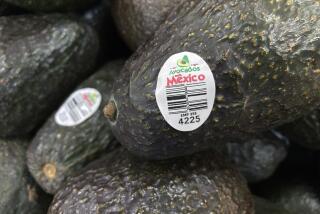Panel Rules Canada Wheat Imports Harm U.S. Farmers : Trade: The finding heightens tensions between the two countries. Ottawa warns of retaliatory measures.
A federal panel stepped up U.S.-Canada trade tensions Friday by ruling that Canadian wheat imports have harmed U.S. farmers and taxpayers and asking President Clinton to curb the shipments.
The Canadian government expressed disappointment at the ruling and warned that punitive trade sanctions would draw retaliation. But trade experts said any sanctions are probably months away.
After a six-month investigation ordered by the Clinton Administration, the International Trade Commission found that imports of durum wheat, used in pasta products, have “materially interfered” with the Agriculture Department’s aid to farmers, costing taxpayers roughly $170 million in the last two years.
The investigation followed a surge in imports of durum wheat from Canada in recent years. The U.S. grain lobby contends that Canada’s rail subsidies enable that country to undercut U.S. farmers on price.
The White House intervention came after lawmakers from leading wheat-growing states extracted promises in return for their support last year of the then-pending North American Free Trade Agreement.
“Imports have resulted in lower prices in the domestic market. These lower prices interfere with the wheat programs by increasing the amount the U.S. taxpayer must pay to farmers,” Commissioner David Rohr said.
By offering their products at unfairly low prices, Canadian farmers have “compromised” the spirit of free trade between the United States and its largest export market and forced U.S. farmers to rely on the Agriculture Department at a time when the Administration is seeking less government intervention in the marketplace, Rohr said.
Commission members recommended that Clinton impose a tariff rate quota, which would penalize Canadian farmers if they export a certain metric tonnage of wheat, or other penalties on Canada. Three of the six panel members qualified their decision, however, saying U.S. action should be temporary.
Holding Canadian farmers to 40% of the average tonnage of wheat exported between 1989 and 1992 would save U.S. taxpayers $25 million a year, one commissioner said.
Canadian officials, who contend that the biggest surge in grain exports to this country simply filled a shortfall created by last year’s floods in the upper Midwest, reiterated that they will return any trade volley.
“Make no mistake,” embassy spokesman Terry Colli said. “If there is punitive action taken here, Canada will react.”
But there are obstacles to any quick U.S. action, including opposition by a key committee in Congress that must authorize the increase in tariffs needed to give teeth to any quotas.
The threatened quotas will more likely be a sideshow to ongoing negotiations with Canada over its grain subsidy policies under the pending General Agreement on Tariffs and Trade, said Robert Kohlmeyer, executive vice president of World Perspectives Inc., a Washington-based farm trade consulting firm.
“Under the new GATT, the U.S. and Europeans agreed to (reduce their grain subsidies), but the Canadian system has been left intact, which gives them freedom to operate very freely and price grain as they see fit,” Kohlmeyer said. “That is a much bigger issue.”
The Canadians have singled out wine and pasta as prime targets for retaliation. Canada is the top export market for U.S. wines, and more than 90% of the 8.9 million gallons that entered Canada from the United States last year came from California.
“We’re watching this very intently. We don’t take it lightly,” said John DeLuca, head of the Wine Institute in San Francisco.
Leeds reported from Washington and Woutat from Sacramento.
More to Read
Sign up for Essential California
The most important California stories and recommendations in your inbox every morning.
You may occasionally receive promotional content from the Los Angeles Times.










